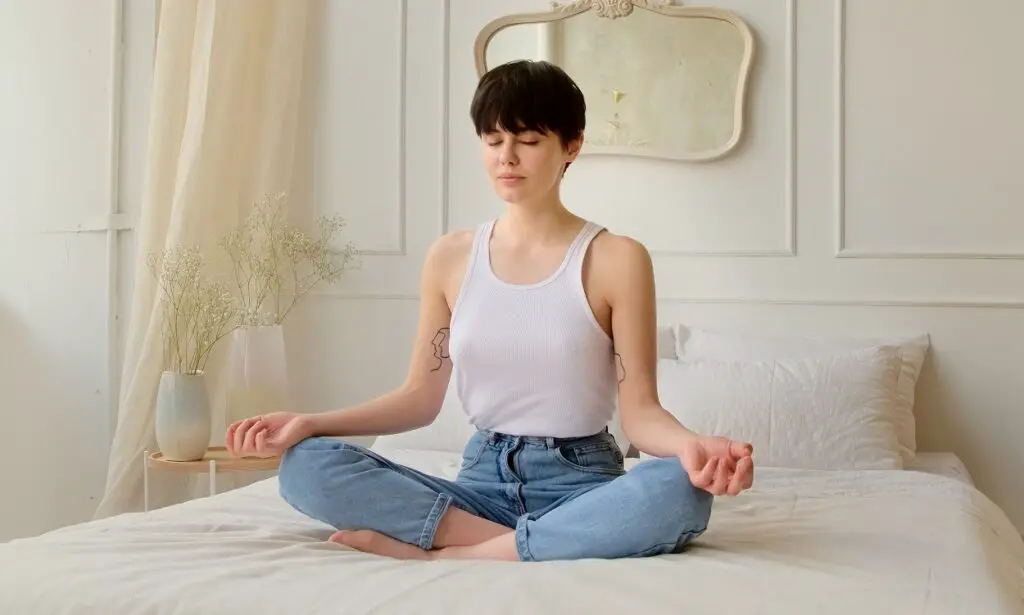Sometimes when you’re trying to sleep at night, your mind may be excited and make it difficult for you to drift off. The worries and cares of the day may keep you awake or may be triggering your body’s sense of danger.
Anytime you’re worried, anxious, or fearful, your body will have a heightened state of alertness. You’ll find it difficult to go to sleep because your body is very aware of what’s going on. You may notice that your sense of smell and hearing seem to be working overtime when you’re worried or fearful.
All of this will make it almost impossible to go to sleep. How to calm down to sleep? If you stay awake in bed tossing and turning in struggling with anxieties, it can take you hours to fall asleep. That’s especially true if you haven’t had much exercise for the day.
You could have a lot of pent-up energy that your body wants to expend or doesn’t know what to do with. Knowing how to calm down and sleep will help you to drift off quicker and get more restful sleep.
I want to share with you a few methods I use to calm down as well as some I’ve learned from other people that can help to relax your mind and your body so that you can drift off quicker.
Clear Your Mind
A lot of what keeps us awake during the night is our anxieties, our fears, worries and concerns. Likewise, the things that excite us and interest us can keep us awake at night too.
You might lie awake in bed thinking about your hobbies or feeling excited for what you’re going to do the next day. Many times, if I have a flight the next day, I’m so excited thinking about my flight that I may not be able to fall asleep at night.
How to calm down and go to sleep when you’re excited or anxious? It helps to purposely clear your mind. Mentally thinking of your mind as a chalkboard or table and then wiping it clean is one method that works for people. You have to force yourself to push out all those thoughts that are keeping you awake, and from there you can start to relax.
Once you’ve cleared your mind, your blood pressure should lower, your heart rate should increase. It should be easier to fall asleep. This also reduces tension in your body, allowing your muscles to relax.
Stretch for Relaxation
Something else you can try that will help do a few stretches when you want to go to sleep period just take a couple of minutes and stretch your arms and legs. This will relieve tension in your muscles and allow your body to feel relaxed.
You’re not looking to do an exercise program and get your heart rate up with some cardio. This is simply a way to stretch out your body and relieve some of that tension that may be pent up.
You can do a few toe touches, a little yoga, neck rolls, and leg stretches. I like to stretch my entire body, moving from one part of the body to the other, perhaps starting in the toes and ending at my fingertips. This way, I make sure that most of the muscles in my body get stretched and relaxed. You can even do stretches like this while sitting in your bed. It’s a great method for how to calm down before sleep without exerting yourself or even getting out of bed.
Deep Breaths
As you stretch, you should take a few deep breaths. Of course, you can do deep breathing on its own without any stretches, if you like. Here is what deep breathing does for you:
Oxygenation
A few breathing exercises will help to oxygenate your blood so that you breathe better while you sleep. Medical experts will sometimes recommend breathing exercises before bed for people who have breathing problems, such as sleep apnea and snoring.
Slow Heart Rate
Deep breathing forces you to calm down and give your heart the opportunity to slow if it is beating too quickly. In other words, it helps to regulate your heart rate and prepare your body for sleep.
Destress
Long breathing exercises will also help to decrease anxiety can stress. As you lower your heart rate and relax yourself with these deep breaths, your mood will improve and it will help you to have less on your mind.
Get on a Sleep Schedule
Anyone who’s having trouble sleeping, calming down before bedtime, or getting enough sleep during the night will likely get the same advice from health experts and sleep professionals. One of the first questions they will likely ask you is whether you have a sleep schedule or not.
This simply means that you go to bed at the same time and wake up at the same time most nights. Some people have a sleep routine during the week and a different routine for the weekend. That may work, but it’s not as good as going to bed each night at the same time and waking up at about the same time each day.
If you do that, you may not struggle to calm down and get to sleep. Your mind will already be prepared. Your body will be relaxed at the time you’re used to going to bed. And your body will be refreshed when you wake up, because that’s when it’s used to waking up. You’d be surprised what your body can adapt to, but once you get into a routine, you’ll give your body less work to do.
This may not help you too much with how to calm down and sleep when overstimulated, but you’ll be less likely to be anxious and wound up before bedtime, once you get into a regular sleep schedule. That sleep routine will prepare you so well that you should have few difficulties going to sleep quickly.
Do Something Relaxing
I want to share with you a list of do’s and don’ts for calming yourself. Some of these won’t apply to certain people, while others may be very helpful depending on what you tend to do before you go to sleep.
Do these:
- drink a hot beverage before bed
- listen to relaxing music
- read a book
- have your partner give you a massage
- take a warm bath
- lower the temperature in your bedroom
- turn off lights and sounds
- turn off screens
- close windows and curtains to minimize noise and lights
- use a sleep mask and earplugs to block out stimuli
Don’t do these:
- keep looking at your phone right before you fall asleep
- keep a light on while you sleep
- talk on the phone right before bed
- exercise right before bed
- keep your room hot
- drink coffee within a few hours of bed
- listen to exciting music
I hope these tips help you understand a little bit how to calm down and sleep at night. You don’t have to struggle with going to sleep and toss and turn in your bed for hours on end if you know how to calm yourself. Try a few of these tips and see how they work for you.
You may have to try them a few times before you can make it happen, especially if you’re used to a bedtime routine that’s kind of exciting, stimulating, and not very healthy. But making these changes and doing some of these relaxing, calming things can make a huge difference.
Not only should you drift off to sleep faster and stay asleep throughout the night, but you should also wake up feeling refreshed and rested and have more energy for the day ahead.
My name is Ellis Francis and I have been a personal fitness trainer, sports nutritionalist and health and fitness advisor for over 25 years. I am the lead health and fitness advisor at https://awellnessbody.com.








